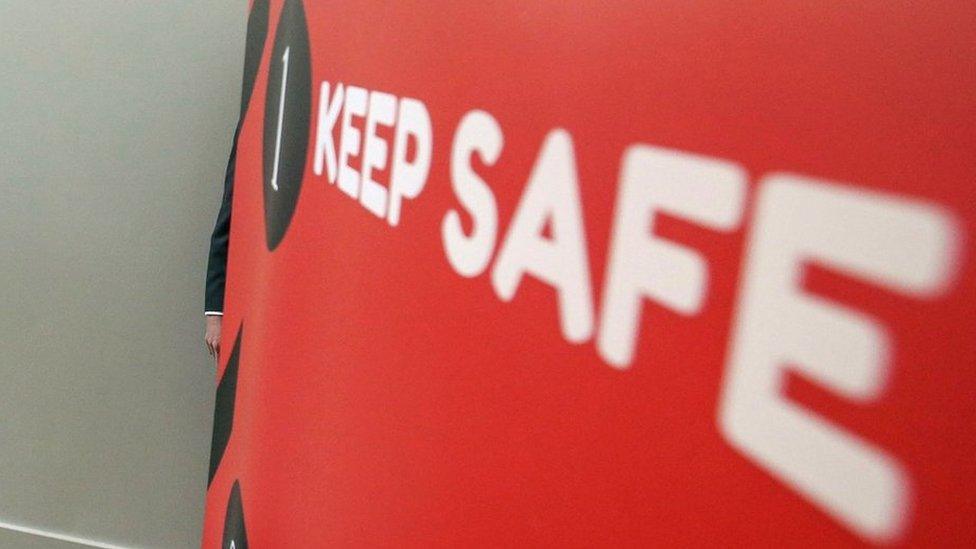Coronavirus: What can we learn from schools that have reopened?
- Published
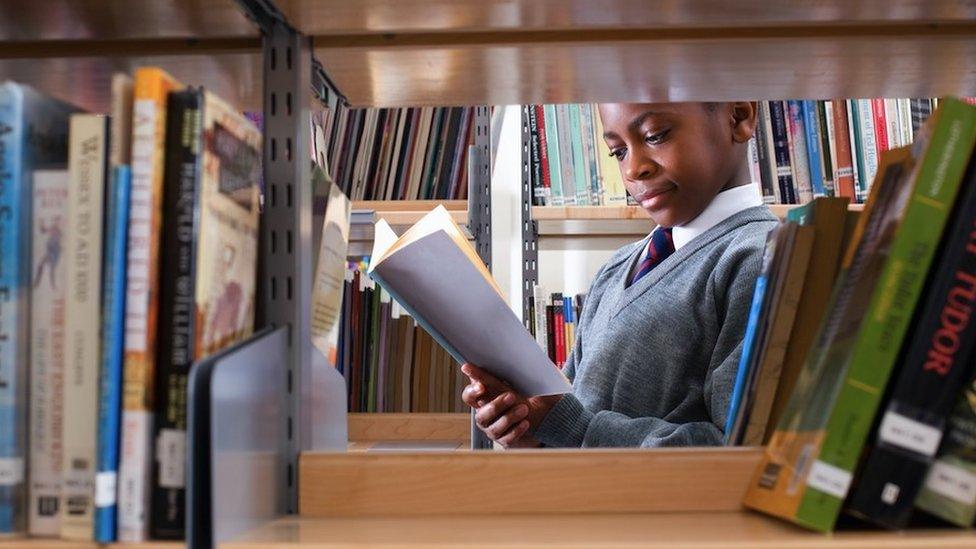
Millions of pupils in England, Wales and Northern Ireland are returning to school within the coming weeks, after months of disrupted education as a result of the coronavirus pandemic. Parents and teachers where schools have already reopened tells us what they've learned from their children returning to the classroom.
Masks and digital-only homework
"Homework is all digital now": Mother-of-three Colette Reilly from Paisley describes what has changed
Masks are a big talking point in Scotland.
Colette Reilly says since her daughters, aged 12 and 14, returned to the classroom, a teacher has told them the current lack of rules about wearing masks is "likely to change" at the school in Paisley.
It comes after criticism from some pupils saying "it's not possible to social distance" inside schools. One high school in Edinburgh has already chosen to tell pupils and staff to wear face coverings while moving around between lessons.
"I've not got an issue with [my children wearing masks]," Colette tells Radio 5 Live.
"Even if it's [for a] year, in terms of a life span, it's a very short-term issue. At the end of the day, this isn't about individual families, this is about the collective. We all need to look after each other."
She says the "significant changes" her daughters have noticed about the return to school life include using hand sanitiser at stations throughout school, social distancing from other students inside classrooms, and being given digital-only homework.
The buzz of the classroom
Scottish teacher and NASUWT member Mike Corbett: "It's not the same, but it's better for the kids to be back in"
Mike Corbett was happy to return to face-to-face teaching at his secondary school in East Dunbartonshire earlier this month.
"Just that buzz of classroom discussion that you get - that's completely impossible online - is a delight to have and one of the best things that we like about teaching," the English teacher tells Radio 5 Live.
Mike, who is national executive member for the NASUWT Scotland teaching union, thinks the pupils are "very happy to be back" too - but there's plenty of pandemic protocols for them to get used to such as regularly using hand sanitiser, not doing group work, and wiping down their desks before leaving the room.
Mike also has things to adapt to. He's frustrated by a line marking out two metres to keep him a safe distance from pupils, because it means he cannot approach individuals who are struggling with understanding his lesson.
But it's "just as well" the line is there, Mike says. On Thursday, his entire classroom had to be evacuated and cleaned as a result of a pupil displaying coronavirus symptoms.
"The only reason I was able to sleep soundly on Thursday night was because I did not cross that two-metre line," he says.
Despite comments from the UK's chief medical adviser, Prof Chris Whitty, attempting to reassure parents, pupils and teachers that schools are safe, Mike says "staff out there are very anxious still about the situation".
He said the recent increase in cases in Scotland means the virus will "inevitably" get into the classroom - "and then the fear is that there's a spread in schools".
'Parents struggling with distancing'
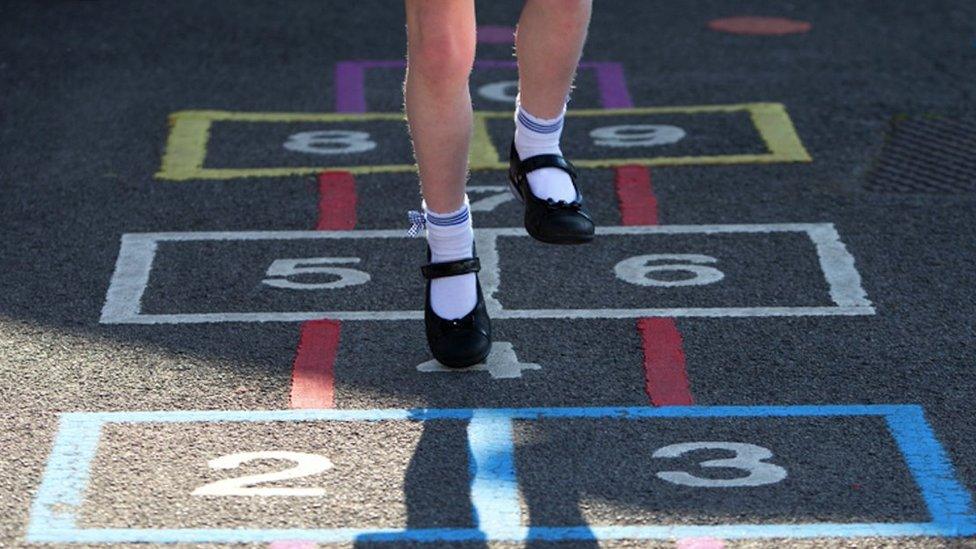
Gemma Fraser said when her eight-year-old daughter Poppy returned to primary school in Edinburgh, the children abided by the rules - and it was the parents who had to be reminded about social distancing.
"The major change is they have to stagger the start times - so my daughter's group is the first in, at 8.40am, and the first to leave," said Gemma.
"The idea is that there aren't as many parents in at the same time. But it's actually been the parents who've been struggling with socially distancing the most - we've had several emails from the school reminding us to stand 2m apart. It feels like being back at school yourself."
She said the playground has been segregated for dropping off and pick-up times so parents don't congregate. There are also separate entrance and exit points.
"We've missed seeing each other as well," she added. "So it's only natural we want to catch up - but we have to behave ourselves."
As for Poppy, she said she bounded out of bed on her first day back - on 13 August - and has quickly adapted to changes.
"They've not found it a problem at all," said her mother. "As far as they're concerned, everything is as normal as can be. They've got used to washing their hands, and sanitising them. Children adapt really quickly.
"They can't have hot lunches now and we have to send a packed lunch in, for them to have in their classroom. So that's a key difference - they also only have 15 minutes to eat it."
There's no social distancing between children in the classroom - but when Poppy's teacher has to get closer to any pupil, she puts a mask on. There is also a line by her desk that children are not meant to cross.
"The school is doing their best," said Gemma. "It's a big school so they've had a mammoth task to organise it. We've been really happy with how they've kept parents informed.
"It's not the same as it was - but it's a lot better than we thought it might be."
How safe is school pick-up?
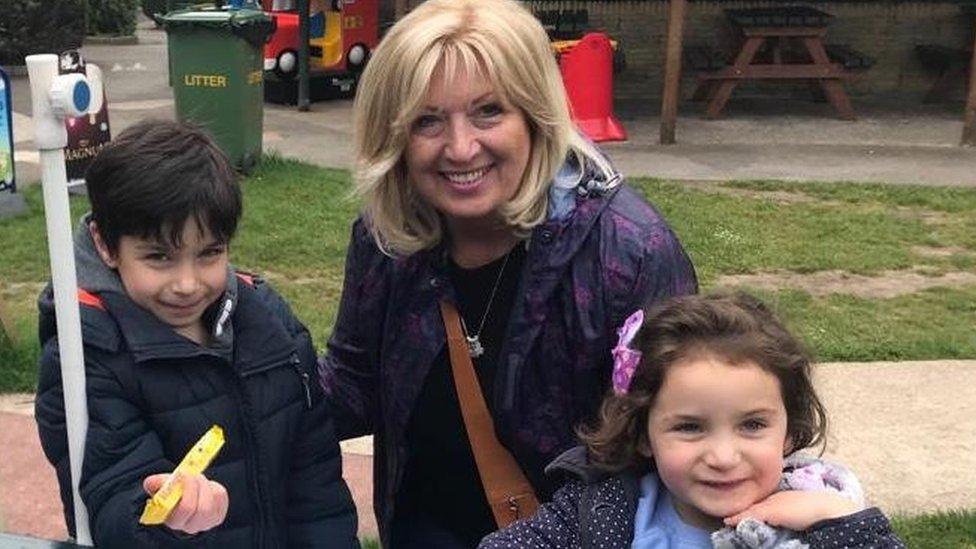
Liz Silverman helps to collect her grandchildren Jack, nine, and Betsy, five, from school
Liz Silverman wants face coverings to be made mandatory within the grounds of her grandchildren's primary schools.
"At collection time all the mums, dads and grandparents have to wait outside the classroom as the teacher will not release a child until they see the parent or grandparent. Social distancing is not possible," she says.
Liz, 69, says her daughter and daughter-in-law are both teachers, so would not be able to return to work without her help picking up her four grandchildren from their two separate primary schools, two days a week.
"I don't feel safe... I would like to say 'no' but I can't let them down," Liz says.
Liz from Northwood, London, believes making adults wear masks when dropping off or picking up schoolchildren is a "simple thing" to solve a surge in cases and assuage her worries about the safety of her husband, who has been shielding. "If I bring anything home to him, it could be devastating."
And the view from Germany
Alex Nunn lives in Berlin, where her 15-year-old step-children have been back to school for two weeks.
"There was no extra spacing or anything like that going on in the school," she says, but that's because teachers and pupils there must wear masks everywhere around the school, apart from once they're seated at their desks.
"As soon as they get up to move around the school, go to the loo, go in the playground, they're wearing masks the whole time," she says.

SCHOOLS: Which are re-opening, when?
SOCIAL DISTANCING: What are the rules now?
LOOK-UP TOOL: How many cases in your area?

Alex, 50, tells Radio 5 Live she struggles to understand why some people in the UK see wearing a mask as "such a big problem", and hopes some anxious parents will learn lessons from her sister, who she has been visiting in London.
"My five-year-old nephew is wearing one here when he's going on public transport. Somehow my sister's managed to make it a bit of an adventure, and fun, and he understands why he's wearing it - and I simply don't get why it's being perceived as being a big deal to wear a mask here," she says.
The World Health Organization has said children aged 12 and over should wear masks in line with national recommendations, citing evidence suggesting teenagers can infect others in the same way as adults.
- Published22 August 2020
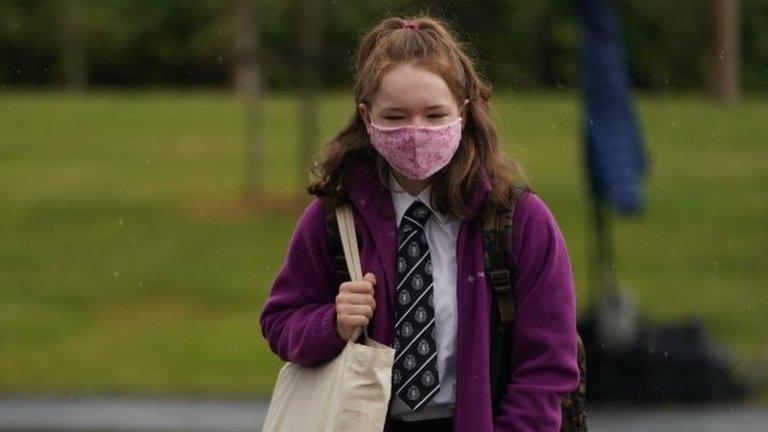
- Published4 September 2020
